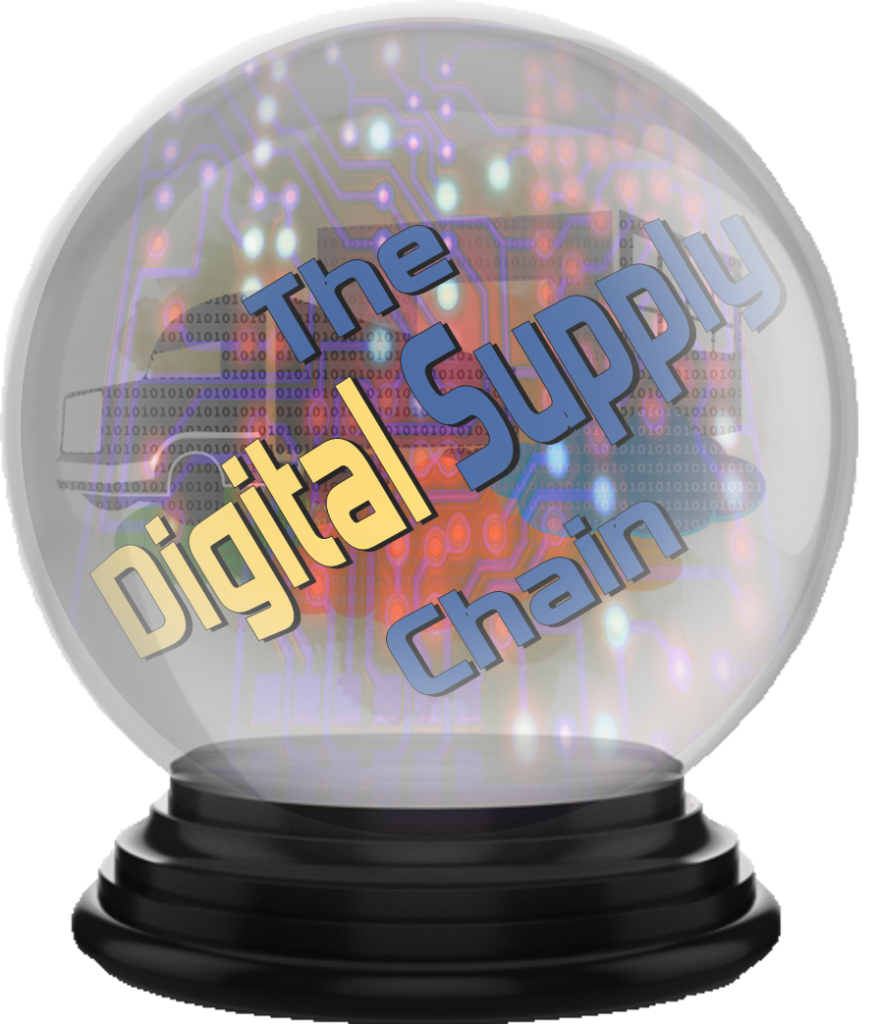In a previous article, I discussed trends and predictions related to supply chains in general. In this article, I will focus on trends and predictions associated with digital supply chain transformation. Kushal Nahata (@kushalnahata), Co-founder & CEO of FarEye, explains, “Digital disruption caused by cloud computing, mobility, AI and analytics is enabling breakthrough innovation in the Supply Chain industry.”[1]
Digital Supply Chain Trends
When discussing digital technologies and the supply chain, it’s wise to manage expectations. Steve Banker (@steve_scm), Service Director for Supply Chain Management at ARC Advisory Group, observes, “Emerging technologies such as blockchain, 3D printing, autonomous mobile robots, IoT, machine learning, and related technologies continue to get a tremendous of amount of publicity. These technologies are being lumped together as ‘Digital’ technologies, although the logic for that grouping — beyond the fact that they are all interesting, emerging technologies — is unclear. But these technologies are at very different points on the supply chain maturity curve.”[2] Victoria Brown (@VJABrown), a technology analyst at IDC, adds, “2018 will be a year of transition for the supply chain as old analog processes give way to new, digital ones. … The supply chain is undergoing unparalleled levels of change. The older measures; productivity, quality, and service still apply, but we now see the specter of digital transformation poised to change everything. Whether it is the way that manufacturers and retailers plan, procure, or fulfill, digital transformation is both opening up new opportunities, and presenting new challenges. Business leaders [who] recognize the real impact of digital technologies on their industry, customers, partners, suppliers, functions, and business practices stand to gain substantial advantage over their competitors.”[3]
Nicole Pontius, marketing communications manager for Camcode, asserts many of the digital supply chain trends are made possible thanks to cloud computing. She writes, “There’s no doubt that cloud technology has transformed supply chain management and logistics operations.”[4] The digital supply chain involves an ecosystem of which cloud computing is only a part. Other parts, include sensors, the Internet of Things (IoT), and cognitive computing. Pontius understands that. She writes, “One of the biggest boons for the supply chain industry made possible by cloud computing is the ability to leverage powerful analytics to make smarter decisions, speed logistics, and enhance both the efficiency and accuracy of the flow of products through the supply chain.” So what lies ahead?
Digital Supply Chain Predictions
Digital Transformation Efforts will Increase. Sawaram Suthar (@sawarams), Chief Marketing Officer at Tagove, notes, “Today, every business is a digital business and the impact of digital strategies on supply chain management is of particular importance. 2018 will be shaped by the success rate of digital transformation efforts.”[5] Brown provides a few predictions about how fast digital transformation will take place. They include: “By 2020, 60% of G2000 manufacturers will rely on digital platforms that enhance their investments in ecosystems and experiences and support as much as 30% of overall revenue. … By the end of 2018, half of manufacturers will be using analytics, IoT, and social collaboration tools to extend the integrated planning process across the entire enterprise, in real time. By 2021, 60% of manufacturers will be leveraging an advanced analytics-driven data aggregation platform for supply chain operational data to improve the speed and accuracy of the fulfillment process. By 2019, 80% of supply chain interactions will happen across cloud-based commerce networks, dramatically improving resiliency and reducing the impact of supply disruptions by up to one-third.”
Cognitive Computing Platforms will Gain Traction. Cognitive computing, a subcategory of artificial intelligence, will be leveraged by more and more companies in the years ahead. Nahata predicts, “By 2021, 25% of large global companies will be piloting or using artificial intelligence automation in transactional procurement.” Suthar adds, “AI is used by several companies as part of their supply management strategies. … This trend will continue to be positively-exploited throughout 2018.” Brown agrees cognitive technologies will be embraced by the supply chain sector. “By the end of 2020,” she predicts, “one-third of all manufacturing supply chains will be using analytics-driven cognitive capabilities, thus increasing cost efficiency by 10% and service performance by 5%.”
Technology will continue to Drive Supply Chain Transformation. In addition to cognitive computing, technologies like blockchain, drones, additive manufacturing, cloud computing, and the Internet of Things (IoT) will impact supply chain operations. Hellen Oti-Yeboah (@hellenoti), Marketing Manager at Arkieva, reports, “[An] IDC Manufacturing Insights report suggests manufacturers who do not embrace digitization will struggle to succeed in coming years. According to the report, by 2018, only 30% of manufacturers investing in digital transformation will be able to maximize the outcome; with the remaining held back by outdated business models and technology. By 2019, 75% of large manufacturers will update their operations and operating models with Internet of Things (IoT) and analytics-based situational awareness to mitigate risk and speed up time to market. Additionally, by 2018, 60% of large manufacturers will bring in new revenue from information-based products and services, while embedded intelligence will drive profitability levels.”[6]
The Push for an Autonomous Supply Chain will Continue. Oti-Yeboah predicts, “The autonomous supply chain will be driven by technologies that are now in early proof of concept stages. Some of these disruptive technologies include Uber’s self-driving truck, Amazon’s drone delivery within 30 minutes or less, and various robotic tasks that are currently replacing mundane tasks at assembly lines, warehouses, and industrial farming environments. … These disruptive technology tests and implementations demonstrate the shift towards an autonomous supply chain in upcoming years.”
Summary
As Banker noted earlier, the types of new technologies that could affect supply chain operations cover a lot of ground and I’ve only touched on a few of them. Nevertheless, these emerging technologies will eventually have an effect on supply chain operations. Greg Kefer, head of marketing for GT Nexus, explains, “The explosion of new devices and mobile capabilities will become more engrained in supply chains. Look no further than what’s happening with home appliances where new refrigerators and thermostats now come with internet connections and mobile apps. Whether it’s a new factory line machine, or a new truck, or a new DC, or yard gate, the supply chain is not immune. New machines are already transmitting granular status and performance information to the central control tower systems that companies use to monitor their supply chains. This will not help the big data challenge facing IT departments, but more information, delivered in real-time, will ultimately solve more problems than it creates.”[7]
Footnotes
[1] Kushal Nahata, “Supply Chain Trends To Watch Out For In 2018,” Supply Chain Management Review, 1 December 2017.
[2] Steve Banker, “Supply Chain Trends To Watch In 2018,” Forbes, 7 December 2018.
[3] Victoria Brown, “Top 10 Worldwide Supply Chain Predictions,” IDC FutureScape, 7 December 2017.
[4] Nicole Pontius, “5 Supply Chain Trends Driven by Cloud Technology in 2017,” Business.com, 11 September 2017.
[5] Sawaram Suthar, “5 Supply Chain Management Trends for 2018,” CXO Today, 23 November 2017.
[6] Hellen Oti-Yeboah, “7 Supply Chain Technology Trends Set to Disrupt Supply Chains in 2017 and Beyond,” Arkieva, 17 January 2017.
[7] Greg Kefer, “Supply chain – predictions for 2018 trends,” Supply Chain Digital, 8 December 2017.





